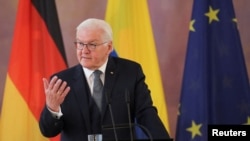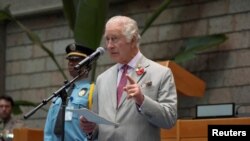Steinmeier was in Tanzania where he expressed his "shame" at crimes committed during his nation's colonial rule in the East African nation.
"I would like to ask for forgiveness for what Germans did to your ancestors here," he said.
The German leader was speaking in reference to the colonization period during which 200,000 and 300,000 Maji-Maji were massacred, according to historians.
Prior to Steinmeier's address in Tanzania, in May 2021 Berlin acknowledged that the massacre of Namibia's indigenous Herero and Nama peoples by colonial-era troops in 1904 was an act of genocide.
King Charles III started his four-day visit to Kenya on Tuesday where he also addressed the colonial past between Britain and the East African nation.
"There were abhorrent and unjustifiable acts of violence committed against Kenyans as they waged ... a painful struggle for independence and sovereignty. And for that, there can be no excuse," King Charles said.
The monarch stopped short of offering the apology demanded by some Kenyans who continue to call on British authorities to do so.
Britain has resisted calls to apologize for abuses under its vast empire, but there have been high-level expressions of regret for specific incidents.
In 2013 Foreign Secretary William Hague spoke in Britain's parliament where she expressed "sincere regrets" for a crackdown against the 1950s Mau Mau uprising in Kenya, announcing $25 million compensation.
The same year, Prime Minister David Cameron described the 1919 shooting by British troops of Indian protesters in Amritsar as "deeply shameful."
Below is a list of other leaders that have addressed their nation’s colonial past.
Belgium to the Democratic Republic of Congo
In a letter addressed to the Democratic Republic of Congo's President Felix Tshisekedi, on the 60th anniversary of the Central African nation's independence, Belgium's King Philippe expressed his "deepest regrets" for his nation's checkered past.
Historians say millions of people were killed, mutilated or died of disease as they were forced to collect rubber under King Leopold II's rule in the 19th century.
France to Algeria
French President Emmanuel Macron in 2018 went further than any of his predecessors in recognizing the scale of abuses by French troops during Algeria's 1954-1962 independence war.
But Macron, like his predecessors Nicolas Sarkozy and Francois Hollande, has rejected calls for France to "apologize or repent" for its time in Algeria.
Italy to Libya
In 2008 Prime Minister Silvio Berlusconi apologized to Libya for damage during the colonial era.
"It is my duty, as a head of government, to express to you in the name of the Italian people our regret and apologies for the deep wounds that we have caused you," Berlusconi said.









Forum